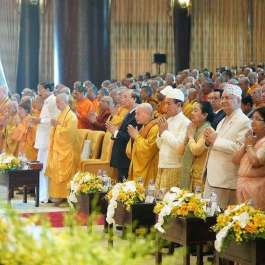Beginner’s Mind is a special project from BDG collecting insightful essays written by US college students who have attended experiential-learning-based courses related to Buddhism. Some of the authors identify as Buddhists, for others it is their first encounter with the Buddhadharma. All are sharing reflections and impressions on what they’ve learned, how it has impacted their lives, and how they might continue to engage with the teaching.
Virginia Leopard is a fifth-year architecture student at the University of Southern California. Virginia has been interested in the study and practice of Buddhism since high school, making a decision to commit more seriously in college. She decided to take a class on Buddhism to understand its place in her life and to begin meditating in earnest.

My Personal Journey
As a fifth-year senior in the Bachelor of Architecture program, I find it somewhat amusing that I am still taking general education classes. However, I have found that these classes tend to be my favorites and a welcome break from the intense world of architecture. Without these classes, I would surely be drowning in a sea of hand-crafting and structural physics classes. While searching for my final general education class, I happened upon Buddhist Modernism. I have always been interested in the study and practice of Buddhism, especially as I try to employ mindfulness in my yoga practices. I have taken several yoga classes since high school, and hoped to continue learning about Buddhist practices with this class. I was pleasantly surprised as we began learning not only about Buddhist history, but also a newer form of Buddhism: socially engaged Buddhism. We discussed issues within the religion that I had never considered, and I began thinking more critically about the religion.
I was raised in a Christian household that attended church every Sunday morning. At some point in middle school, I realized that I did not personally identify with Christianity. Although I did not identify as an atheist and reject religion altogether, I felt as though Christianity was not specifically for me. I learned of Buddhism while entering high school, and was very intrigued. However, I felt that if I actively pursued my interest I would be judged for being a “basic white girl who is suddenly into Buddhism,” which is fair. I did not want to suddenly take on a religion and culture to which I had no previous exposure; I felt as though I was appropriating something that was not mine. Because of these internalized feelings, I stuck to researching and simply appreciating Buddhism from afar. I did not feel licensed to claim Buddhism as my own, so I resorted to identifying as “spiritual.”
Needless to say, I was very excited when I found this class on Buddhist Modernism. I had waited long enough to truly embark upon learning the history of Buddhism, and was looking forward to meeting classmates who shared my interests. Although I should have seen it coming, my last semester at USC hit me harder than I could’ve expected. I had thought that my mental state was very stable and could take a few hits, but with the pandemic and everyone going their separate ways, I struggled immensely: depression and anxiety were full-blown and every day felt like a struggle. To my surprise, going to class—especially Buddhism Modernism—helped to keep me grounded. I was happy to start taking meditation more seriously, and downloaded the Headspace app to keep me in practice. I appreciated how we would use the same audio each time we meditated in class, which definitely helped me and other beginners to enter into the right mindset.
When I began this course, I expected to strictly focus on learning about the history of Buddhism. Instead, I found like-minded individuals who wanted to dive into their own religious studies, a passionate professor, and a safe class space. I felt comfortable speaking during class and meditating with the group. The class had great energy overall, and I left each session with something new and different. Looking back on the questions I first answered, it is interesting to reflect on my past self. I did not expect this class to teach me as much about modern-day society—especially when we tied in socially engaged Buddhism. Making Buddhism accessible and socially engaged encourages younger generations to pursue the path to enlightenment. No religion is without faults, and diving into Buddhism’s particular outdated flaws presented an analytical view of the religion as a whole. Instead of viewing the practice of Buddhism as holy and untouchable, we began analyzing its flaws and how it has been largely male-focused. Our creative projects at the end of the class really highlighted how each student resonated with the different subjects we learned about.
Moving forward from here, I believe that we should promote Buddhist ideals to younger generations and allow them to forge their own spiritual paths. As a young person raised in a very Christian household, I felt very pushed in a particular direction. Deviating from the Protestant Christian path was not well regarded, and critiquing or analyzing the religion was also considered taboo. What I appreciate most about this class is the close examination of different types of Buddhism, as we compared and contrasted them and applied them to our own lives. Furthermore, the creative project at the end of this class was a great way for each group of students to hone in with a particular lens.
As I reflect on this class and my cetanā (Pali. volition) and vipassanā (Pali. insight), I found that through consistent meditative practice and mindfulness, I was able to better understand my mind and how to manage negative thoughts. A mantra I created for myself, that I believe would sum up this class well, was: “manage, not control.” If we try to control aspects of our lives, our peers, and our minds, it will be frustrating and ineffective. If we instead learn how to manage and mitigate negative feelings, we’re more likely to see better results. Learning this practice and passing it on to younger generations will surely lead to a more peaceful and empathetic world.
Related features from BDG
On Wisdom
Buddhist Modernism: A Transformative and Empowering Think Tank for Social Change











